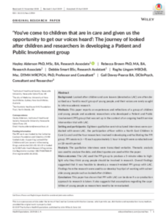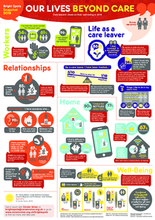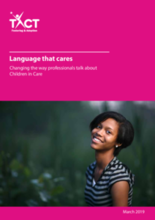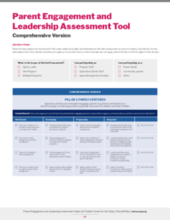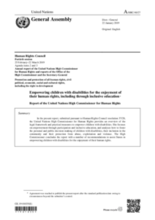Displaying 121 - 130 of 345
This open access paper reports on experiences and reflections of a group of children and young people and academic researchers who developed a Patient and Public Involvement (PPI) group that was set up in the context of an ongoing health service intervention trial with Looked after children and care leavers (denoted as LAC).
In this article, the authors provide children’s insights into their own life experiences and individual identities. The data was collected during an ethnographic research in one of Estonia’s SOS Children’s Villages (SOS CV).
This open access research paper examines the influence of children, birth parents and foster carers on the matching decision from a practitioner's perspective.
This snapshot summarises the findings from the responses of 474 16-25 year old care leavers who completed the Your Life Beyond Care (YLBC) survey in 6 local authorities in England - an overall response rate of 30%. This snapshot gives an insight into how care leavers really feel about their lives.
The primary aim of this study is to summarise research findings about the use of assessment frameworks, that is, structured models that guide information collection and decision making in child protection services, by reviewing the literature.
Language That Cares is a collaborative effort led by TACT that aims to change the language of the care system. Language is a powerful tool for communication but sometimes the way that it is used in social care creates stigma and barriers for understanding. Language is power, and we want children and young people to feel empowered in their care experience.
This study tests the prediction that foster youth who perceive having more opportunity for voice, even indirectly via a representative, more favorably rate the dependency system.
This resource is designed to help agencies, systems, and collaboratives working with young children and their families to chart a course toward an expanded approach to family engagement.
In the present report, submitted pursuant to Human Rights Council resolution 37/20, the United Nations High Commissioner for Human Rights provides an overview of the legal framework and practical measures to empower children with disabilities.
This article provides a review of indicators of child well-being in the six Gulf countries (Bahrain, Kuwait, Oman, Qatar, Saudi Arabia, and the United Arab Emirates), focusing on well-being in six domains: physical health, behavioral adjustment, psychological well-being, social relationships, safety, and cognitive well-being. The article highlights children's participation in decisions affecting their lives, relationships with parents and caregivers, and protection from abuse and neglect, among other indicators.

